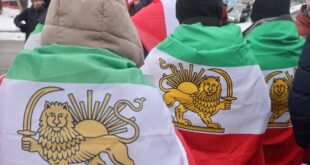 Turkey once again defended energy ties with Iran and Russia, despite US official calls on Turkey to seek alternatives such as agreeing with other regional suppliers including Turkmenistan and Kazakhstan. The US opposition to Iran-Turkey gas deal was once again voiced during the recent visit of US Undersecretary of State Nicholas Burns to Ankara.
Turkey once again defended energy ties with Iran and Russia, despite US official calls on Turkey to seek alternatives such as agreeing with other regional suppliers including Turkmenistan and Kazakhstan. The US opposition to Iran-Turkey gas deal was once again voiced during the recent visit of US Undersecretary of State Nicholas Burns to Ankara.
After a meeting with Prime Minister Recep Tayyip Erdogan, Burns answered questions of reporters where he called for UN Security Council members and US allies to help push for a third round of sanctions against Iran over its nuclear work.
Burns said United States’ allies and friends like Turkey, Germany, Japan, South Korea, and India should consider new sanctions on Iran.
Furthermore, Burns pointed out that an energy deal signed between Iran and Turkey in July was not helpful. The preliminary deal foresees the construction of two separate pipelines to ship natural gas from the fields in Iran and neighboring Turkmenistan via Turkish territory.
“We don’t think that it makes sense to announce long-term oil and gas deals with Iran,” he said. “But again we are not singling out Turkey for criticism or attention, this is general US and West European message to many other countries.”
However, responding Burns, Erdogan said, “Russia and Iran are Turkey’s most important sources in terms of natural gas. Currently, our people consume natural gas in 47 out of 81 provinces. We aim at making use of natural gas nationwide.”
Before leaving for the US, Erdogan said Turkey’s natural gas demand was increasing because of domestic industrial growth and the growing requirements for heating. “It is impossible for us to say, we are cutting natural gas cooperation with these countries.”
Following Erdogan’s remarks, Energy Minister Hilmi Guler said he would meet his Iranian counterpart next month to sign a major energy deal.
Answer to Turkey came quick and over the weekend US Undersecretary of Economic, Energy and Agricultural Affairs Reuben Jeffery who told a news conference, “There is no shortage of gas in the region. The question is developing it in a responsible way with states that are politically stable and responsible to the international community.”
Jeffery attended a conference of around 20 states to discuss how West Asian, Caspian and Central Asian countries could diversify their energy export routes.
Iran is Turkey’s second biggest supplier of natural gas after Russia. Turkey and Iran signed a preliminary agreement on July 24, which revolved around the construction of two pipelines.
Turkey plans to invest 3.5 billion dollars in Iran for gas production. The first pipeline would originate from Iran’s South Pars gas field and second from Turkmenistan, Iran’s Central Asian neighbor. Analysts say Turkey can use part of this gas for its own consumption. The rest can be transferred further into Europe along the upcoming Nabucco pipeline.
From the first day the United States has opposed the agreement.
Some media circles even claim that the growth in bilateral trade between Turkey and Iran appears to be part of the ruling Justice and Development (AK) Party’s strategy of trying to strengthen economic ties with other Muslim countries.
 Eurasia Press & News
Eurasia Press & News



